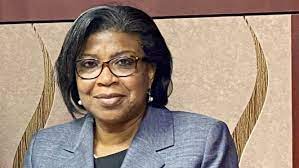The Debt Management Office (DMO) has stressed the need for Nigeria to generate more revenue as a fiscal step towards reducing government’s borrowing to fund critical projects and good governance in the country.
The Director-General of the Office, Ms. Patience Oniha, in her remarks during an interactive chat with journalists on Wednesday in Abuja, pointed out that a strong revenue base would reduce the need for the new borrowing by the government as well as the debt service to revenue ratio.
Citing the ‘World Bank’s World Economic Outlook for 2020’ report which showed that Nigeria with a revenue to GDP ratio of 6.3 per cent was ranked at 194 out of 196 countries covered to justify her position, Oniha appealed to the Nigerian media and other analysts to focus more on the imperative of improved revenue in their analyses of the public finance .
The expert said: “Revenue is the way to go, and that is how countries develop and use borrowing to augment revenue shortfalls now and again. Nigeria has been running budget deficits for decades; it is about time to shift to a balanced budget and even surplus budgets.
“One issue to be addressed is the petrol subsidy, which has significantly increased annual budget deficits and ultimately increased the level of new borrowings and the public debt stock.
“There is a vital need to ramp up crude oil production and end crude oil theft and pipeline vandalism to meet oil revenue targets, especially in the light of rising crude oil prices”, the director-general added.
The debt management expert, who maintained that said such steps would create an avenue for efficient tax collection and a broader tax base, identified some of the structural challenges affecting the nation’s economic performance as including insecurity, inflation, infrastructure deficit and foreign exchange shortages.
On growing public criticisms of the DMO over the nation’s rising public debt profile in recent times, the director general described the role of the Office as advisory in relation to public debt, which covers new borrowing, debt negotiation and debt management strategy as provided for in DMO Establishment Act, 2003 and the Fiscal Responsibility Act, 2007.
According to her, Nigerians attacking the DMO over debt management do not understand the legislations and regulations governing borrowing and public debt management.
She said: “Public debt has grown over the last years as the government borrowed to meet major revenue shortfalls, increased spending on security and infrastructure, as well as funding on health due to the COVID-19 pandemic.”
Oniha further explained that the levels of new borrowing to meet these needs “are often captured in the annual Appropriation Acts and Medium Term External Borrowing Plan”, adding that one of the things omitted in the analyses by experts is that new borrowing will automatically translate to higher debt stock and debt service levels.
In the past few years, Nigeria’s cost of debt servicing has been generating serious concern in the public domain as experts believe that the nation’s borrowings and debt servicing allocations are not sustainable.
For instance, available data showed that Nigeria’s debt servicing bill rose by 109 percent in the first quarter from N429 billion in December 2021 to N896 billion in March 2022.
According to data from the DMO, Nigeria spent N3.83 trillion on debt servicing in 15 months.






